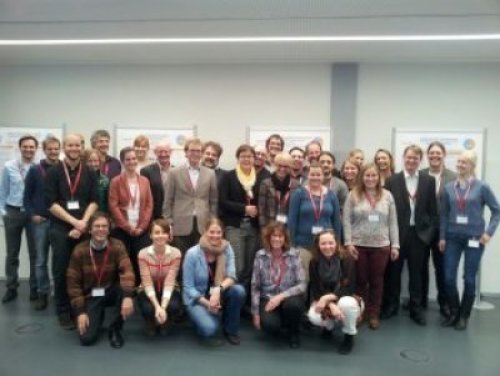The concert of dolichol-based glycosylation: from molecules to disease models
The covalent attachment of sugar units to proteins is a complex posttranslational modification found in all domains of life. N-glycosylation, C-mannosylation and O-mannosylation are prevalent and highly conserved glycosylation pathways, all essential for vertebrate development. The three pathways start in the endoplasmic reticulum, are based on the lipid dolichol and compete for both mannosyl donor substrates and acceptor proteins, which in many cases receive more than one type of glycan. Along these three glycosylation routes, today we know of endoplasmic reticulum associated defects in over 30 genes that cause devastating multisystemic disease manifestations (congenital disorders of glycosylation (CDG-I)), underlining the importance of these processes.
So far, the three mentioned glycosylation pathways have been studied independently from each other. However, to understand the complexity of glycosylation disorders, it is imperative to decipher the details of the dolichol-based N-glycosylation, C- and O-mannosylation pathways, as well as the precise conditions for their interconnections. To address these questions on the molecular, cellular and organismal level, we have not only brought together experts in N-glycosylation, C- and O-mannosylation, but also in structural and lipid biochemistry, in proteomics, glycoproteomics, glycomics and lipidomics, as well as in developmental biology. In the frame of the collaborative Research Unit, we can thus make use of the newest methodological developments in the different fields. Our vision is to gain a deeper understanding of dolichol-based glycosylation to facilitate the development of diagnostic tools and new therapeutic approaches.
The ten groups of the research unit are situated at four different location: Heidelberg University, University of Frankfurt, Hannover Medical School, and Max Planck Institute Magdeburg.

List of research groups and projects:
- P01 "Involvement of C-mannosylation in endoplasmic reticulum protein processing and implications for specific target proteins" (Dr. Hans Bakker, Hannover Medical School, Cellular Chemistry)
- P02 "Protein-lipid interactions and the influence of cellular lipid environments on glycosylation processes" (Prof. Dr. Britta Brügger, Heidelberg University, Biochemistry Center (BZH))
- P03 "Characterization of induced pluripotent stem cell-based disease models for congenital disorders of glycosylation" (Jun. Prof. Dr. Falk Büttner, Hannover Medical School, Cellular Chemistry)
- P04 "Unravelling the correlation between different ER-based types of glycosylation via glyco/proteo-analytics" (Dr. Erdmann Rapp, Max-Planck-Institut für Dynamik complexer technischer Systeme, Magdeburg)
- P05 "Monitoring the glycosylation network by quantitative mass spectrometry to study its functional and structural organization" (Dr. Thomas Ruppert, Heidelberg University, Center for Molecular Biology (ZMBH))
- P06 "Effects of glycosylation on protein structure, function and dynamics" (Prof. Dr. Harald Schwalbe, Johann Wolfgang Goethe-University Frankfurt, Institute for Organic Chemistry and Chemical Biology, Center for Biomolecular Magnetic Resonance (BMRZ))
- P07 "Structural basis of protein O-mannosylation" (Prof. Dr. Irmgard Sinning, Heidelberg University, Biochemistry Center (BZH))
- P08 "Protein O-mannosylation and its diverse interplay with N-glycosylation" (Prof. Dr. Sabine Strahl (coordinator), Heidelberg University, Centre for Organismal Studies (COS))
- P09 "Complex formation and pathological mechanisms in the initial steps of the N-glycosylation pathway" (PD Dr. Christian Thiel, University Hospital Heidelberg, Center for Child and Adolescent Medicine, Center for Metabolic Diseases)
- P10 "The role of ER-resident glycosylation in vertebrate neural development" (Prof. Dr. Joachim Wittbrodt, Heidelberg University, Centre for Organismal Studies (COS))
- Coordination (Prof. Dr. Sabine Strahl (coordinator), Heidelberg University, Centre for Organismal Studies (COS))

